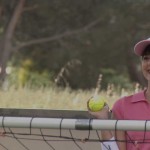¿Dónde está mi bikini?
Ágatha is looking for her swimsuit. Sandro and Paco used it for something unusual.
In this episode you will learn: how to ask for something in Spanish, how to be angry in Spanish, how to excuse yourself in Spanish.
SANDRO: Y viene la chica al día siguiente y me pregunta si podía dejar el cepillo de dientes en mi casa.
PACO:¡Qué bonito! Eso significa que quiere una relación más seria.
SANDRO: ¿Bonito? !Eso es un drama! Yo no quiero a una chica más de dos días en mi casa.
PACO: Pero… entonces… ¿le dijiste que no?
SANDRO: ¡Pues claro!
ÁGATHA: ¡Hola chicos!
SANDRO: ¡Hola guapa! Vigila no te haga vuelta y vuelta y te coma.
ÁGATHA: Anda, calla… ¿Habéis visto la parte de arriba de mi bikini?
SANDRO: ¿Yo?, qué va?
PACO: No, no…, jamás lo he visto, nunca… Bueno, sí, cuando la llevas puesta.
ÁGATHA: Y eso que asoma por ahí y que no parece carbón ¿qué es?
SANDRO: ¿Esto? yo que sé.
ÁGATHA: Levántalo. ¡Levántalo!
Oh my God!¡Habéis utilizado mi bikini para hacer la BBQ!
¡Yo os mato! ¡Os mato!
PACO: Entiéndenos, no teníamos con que prender y se nos ocurrió que la mejor opción era tu bikini…
SANDRO: And the girl arrives the next day and asks me if she could leave her toothbrush in my house.
PACO: How beautiful! That means she wants a more serious relationship.
SANDRO: Beautiful?! That is a tragedy! I do not want girls in my house for more than two days.
PACO: But…so…You told her no?
SANDRO: Of course.
ÁGATHA: Hello, boys!
SANDRO: Hey, beautiful. Watch out I don’t put you on the grill and eat you up!
ÁGATHA: Shush…Have you seen my bikini top?
SANDRO: Me? Absolutely?
PACO: No, no, I’ve never seen it…well, yes, when you wear it.
ÁGATHA: And that thing sticking out over there which doesn’t seem like coal, what is that?
SANDRO: This? Who knows.
ÁGATHA: Pick it up! Pick it up!
Oh my God! Have you been using my bikini to BBQ?!
I’m going to kill you! I’m going to kill you!
PACO: You have to understand that we didn’t have anything to ignite the BBQ with.
Me pregunta si podía dejar el cepillo de dientes en mi casa.
She asks me if she could leave her toothbrush at my home.
En España dejar el cepillo de dientes en casa de otra indica que se puede empezar una relación seria y formal entre dos personas
Eso significa que quiere una relación más seria.
That means she wants a more serious relationship.
Significar, es un verbo que termina en AR. En esta frase está en Presente.
Vigila que no te haga vuelta y vuelta.
Watch out I don’t cook you up.
Vigila, es una forma en Imperativo, expresa una orden o consejo. Hacer vuelta y vuelta, es una expresión para indicar que se cocina por ambos lados.
¿Habéis visto mis gafas?
Have you seen my glasses?
Haber + participio. This is a form we use to express an action in the past very close to the present time. The verb HABER has different forms, which are: HE, HAS, HA, HEMOS, HABIS, HAN. But the participle doesn’t change for all the verb. So, for the verb VER, the participle is irregular and is VISTO. In the dialogue there are more examples like: he mirado, has puesto, ha sido.
Other regular participles are formed like this; when the verb ends in AR, participle ends in ADO like HABLAR –HABLADO. When the verb ends in ER/ IR, participle ends in IDO like BEBER– BEBIDO or SALIR –SALIDO.
¡Qué va!
Absolutely!
Es una forma muy coloquial de decir “en absoluto, jamás, nunca”. Ejemplo: ¿Has comido alguna vez insectos? ¡qué va!
Entiéndenos, por favor
Understand us, please
Entiende es una forma en Imperativo que expresa orden del verbo Entender. NOS, es un pronombre que se refiere a Nosotros. Se coloca detrás del verbo cuando es un Imperativo. Otros ejemplos: Vámonos, Díganos…


